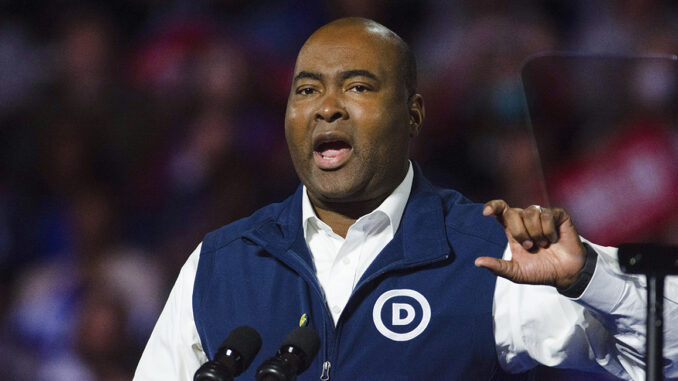
ATLANTA — As he concludes his time as chairman of the Democratic National Committee, Jaime Harrison is downplaying his party’s November loss to President-elect Donald Trump and arguing Democrats avoided even greater losses that parties in power have faced around the world.
But he acknowledged that Democrats must do a better job of selling the party’s priorities and accomplishments for the working class. He also called for continued nationwide investments in party infrastructure and better use of non-legacy media.
“I can’t tell you how disappointed I am that Kamala Harris is not going to be the next president of the United States,” Harrison said in an interview Monday. But “the political pendulum in this country has been swinging swiftly, back and forth,” he added, and “we got to buckle up and get ready for it” to continue.
Harrison made similar arguments in a memo being distributed Tuesday to Democratic Party leaders and donors around the country.
“Although Democrats did not achieve what we set out to do, Trump wasn’t able to capture the support of more than 50% of the electorate and Democrats beat back global headwinds that could’ve turned this squeaker into a landslide,” Harrison wrote, comparing Democrats’ losses in the U.S. to the more sweeping defeats that parties in power suffered in democratic nations around the world since the coronavirus pandemic and global inflation.
It is not surprising, of course, for a chairman to defend his party’s performances even after disappointing elections. Harrison, President Joe Biden’s pick in 2021 to lead the national party during his term, and other top Democrats have been sharply criticized after Trump’s victory, particularly by progressives who argue the party is seen as having abandoned working-class voters.
Harrison pointed to victories for Sens.-elect Ruben Gallego in Arizona and Elissa Slotkin in Michigan, and the reelections of Sens. Jacky Rosen of Nevada and Tammy Baldwin of Wisconsin.
Republicans still ousted Democratic senators in Pennsylvania, Ohio and Montana on their way to a majority. But Harrison noted the GOP’s House majority will be threadbare — the final count is pending — and that Democrats flipped some Republican seats.
At the state level, Harrison noted Democratic romps in North Carolina’s statewide offices, legislative gains in a conservative state like Arkansas and stripping Republicans of outright control of the Alaska statehouse.
“It was a mixed bag,” he said.
Trump swept all seven battleground states against Harris, the Democratic vice president, and won the popular vote for the first time in three presidential runs. The president-elect cut into key Democratic constituencies: people of color, younger voters and union supporters.
He gained a larger share of black and Latino voters than he did in 2020, most notably among men under age 45, according to AP VoteCast, a nationwide survey of more than 120,000 voters. And his coalition increasingly included rank-and-file union members, a critical constituency in states like Michigan, Wisconsin and Pennsylvania.
Harrison said Trump has the ability to scramble traditional coalitions but not remake them permanently. He acknowledged Trump’s appeal yet framed him as a unique figure whose reach cannot be replicated easily, if at all, by other Republicans.
“It’s the same thing with Barack Obama, right? Sometimes in politics, they’re cultural figures … that can build different coalitions,” Harrison said. “And those coalitions don’t last once they step off of the dais.”


